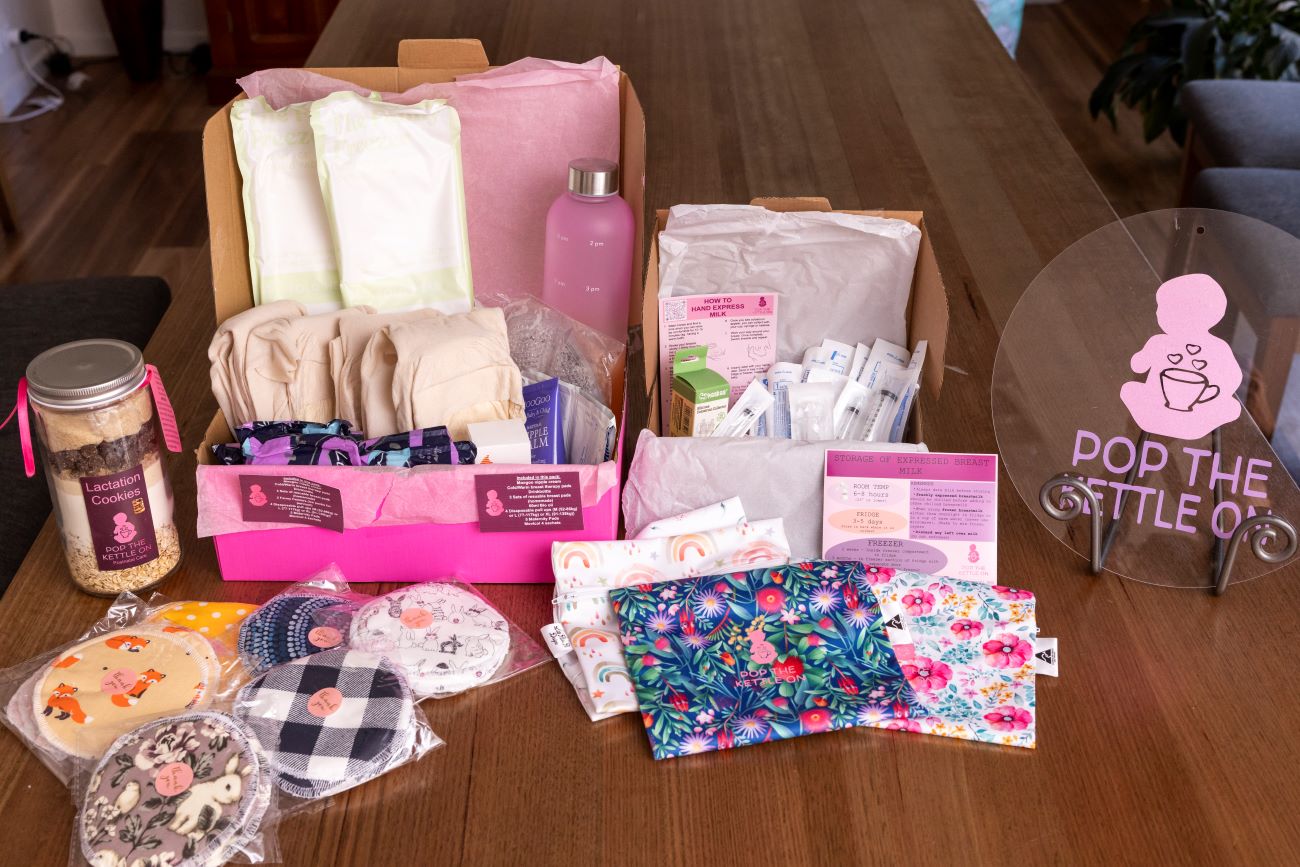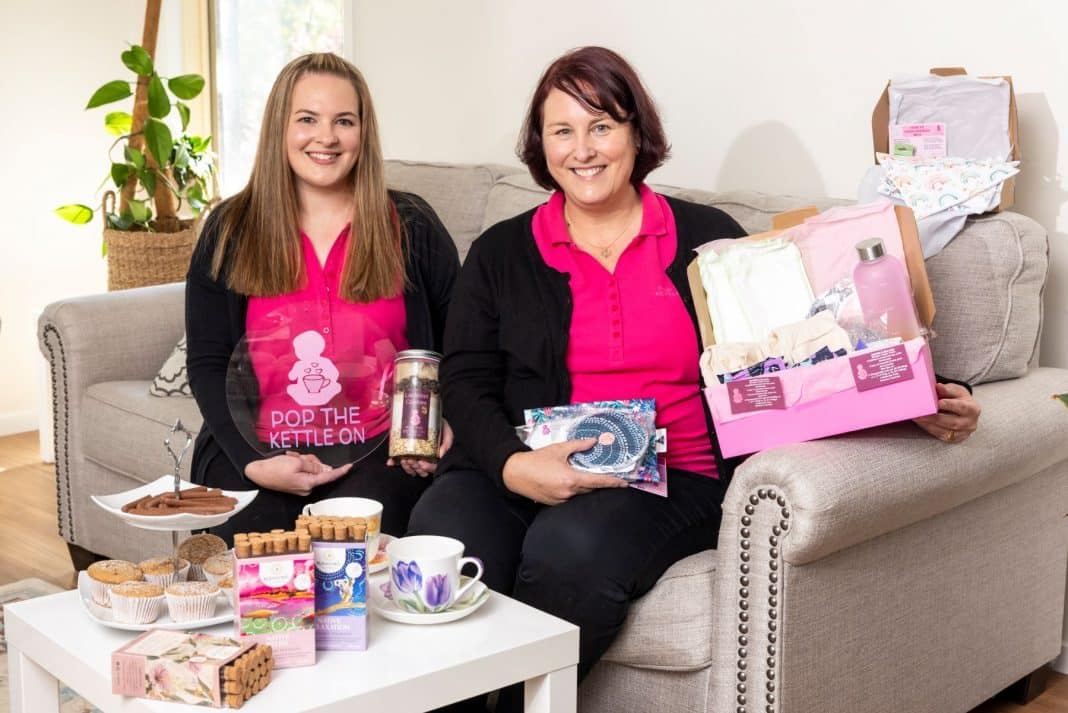Adjusting to life with a new baby can be a tricky and daunting time for a mother, whether it is her first child or third. With a dash of hot water, a welcoming presence, and a listening ear, the team at Pop the Kettle On aims to make the transition of welcoming a new bub into your life as smooth as possible.
Friends, colleagues and now co-founders of Pop the Kettle On, Shireen Leonard and Sarah Ingram, met in 2009 when they undertook the first Bachelor of Midwifery course at the University of Canberra together. They went on to work at the same hospital in the postnatal ward, where they care for mothers and babies after birth.
“Breastfeeding support, for us to show and facilitate how to make formula, how to hold their baby when they’re formula feeding, how to hold their baby when they’re establishing breastfeeding,” says Sarah. “Then complex postnatal recovery, huge haemorrhages, or big tears, caesareans.”
While at the hospital, the women offer midwifery and nursing support, however, with their new business they will not be working in any midwifery capacity. They say they are there to offer support from one mum to another – with just a bit more practice.
“We’re not doing anything clinical with women – that’s not what we’re wanting to do – we do that elsewhere,” says Shireen.
“It takes a village to raise a family, to raise a child,” says Sarah. “I think we saw it more in Covid, how hard it was for people. Cultures where their parents come from overseas, they couldn’t come over, so they were here by themselves and just trying to figure it all out.”
The services offered by the women are broad and cater for the needs of each client. Sometimes it could look like laundry, cleaning and childminding, other times it could be breastfeeding support, someone to talk to, or a gentle massage.
The initial one-hour appointment provides the meet and greet, as well as a better understanding of each situation and what services are required.
“Just sit down and talk, see what you need. It’s working together to see how we can help you; we want you to tell us. Do you want to just go have a sleep? Go have a sleep; we will tidy up around the house while you go do that, just take the pressure off yourself,” explains Sarah.
The skill to be able to quickly pick up on what someone needs is one they have developed on the job, sometimes only having ten seconds to build rapport with someone new. They use this skill to quickly make a woman feel comfortable and be able to ask for the help they need.
“There’s no judgement at all. If they need somebody to look after their little one while they go on a date with their husband to reconnect again, we’re there for that. If they need to go and have their legs waxed, it’s self-care,” says Shireen.
Having launched the business in February, they are still working some aspects out, such as whether services will extend only until six months after birth.
“They’ll be in a routine, they’ve got in the community, and they’ve met their friends again,” says Shireen.
If not, they say the support required is probably more than their business can offer but they can help their client find appropriate help.
“We can lead and point in the areas of in the community that are trained in that… but we’re not trained for that sort of area, we’re not going to be doing psychology. We’re just there to have a chat,” says Shireen.
During her time as a stay-at-home mum to three children, Shireen was invited to watch two of her friends give birth. She says the privilege of being a part of that experience as well as thinking about returning to the workforce helped make her decision of what she wanted to do. She was also greatly inspired by one of her own midwives, who also went on to be a mentor to her.
“I just wanted to emulate her, I wanted to provide the care to women the way she did, and I feel like I do … Chris was sort of just no airs and graces, it just was fun, and the way she helped me, the way she made me just think about my children moving forward,” she says.
One of Shireen’s sons was quite unwell at the beginning of his life, which helps her empathise with mothers experiencing something similar.
“I could put myself in their shoes, I know what they would benefit from having. It wasn’t until I went to uni, doing a mental health unit that it really hit me what had happened during Isaac’s birth, and I thought ‘Wow, women really need to know what services are out there to help you move through the rest of these years’,” says Shireen.
For Sarah, her interest in midwifery was sparked after witnessing the birth of three cousins – the first when she was still in high school. The birth centre experience during her aunt’s labour, and how the midwives interacted with her, sparked something for the future midwife.
“I thought, caring for a woman and supporting a woman through antenatal, postnatal, during birth, that’s what I want to do. To be there to support them and their families, help them feel empowered,” says Sarah.
Since starting their midwifery careers, the pair has seen the time women spend in hospital after birth reduce. They say it used to be that new mothers would stay until their milk came in, which is a time when hormones change, and the baby blues may start to appear. Now, though, new mothers can be discharged as soon as six hours after birth.
“If it’s their first baby especially … a lot of people don’t have family that live around them these days and the first night at home, or the second night the baby cluster feeds and they don’t know that, and they’re like ‘why is my baby just wanting to feed all night and crying?’,” says Sarah.
Mothers are sent home with birth registration papers, but no manual, says Shireen, largely being left to go through it on their own. Some of the mothers have never even held a baby before having their own. She’s concerned that sometimes when left to their own devices, the information they find might not be from a best-practice source.
“We just wanted to let women know that we were here and, yeah, we can give you good, great practical safe information,” Shireen says.
Not all their clients are first-time mothers; some have multiple children and just need a bit extra help in the evenings for the nightshift feedings.
“We’ve had quite a few enquiries from people with their third baby asking about doing nightshifts because they’ve got the two others that they need to be with during with the day,” says Sarah.
“Their partners were working longer hours and heavier jobs, so they needed to have some rest,” agrees Shireen.
Whatever the reason their support is needed, Sarah and Shireen are eager to help other women just as they were helped after the birth of their children. They know they got lucky having large family and friendship circles there for them and they want to help pay it forward.

“You tell us how you want to do this, and we’ll help you do whatever you need to do safely and to grow and bond and love your little baby,” smiles Shireen.
Wanting to offer a cohesive package of care, they are in talks with other local businesses, such as fitness studios and physios, on how to support one another. While Sarah also makes up beautiful care packages for new mums or mums-to-be, sewing items herself, she also gathers things that are essential during that time.
You can find the packages on the website or spot the Pop the Kettle On women at an occasional market around town.
Whether you’re a new mum or know a new mum, you can find support with Sarah and Shireen at Pop the Kettle On; popthekettleonpostnatalcare.com.au
Get the latest Canberra news, sport, entertainment, lifestyle, competitions and more delivered straight to your inbox with the Canberra Daily Newsletter. Sign up here.



